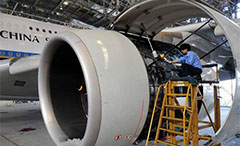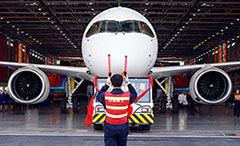Two China-made planes formally handed over to Nepal’s national flag carrier
2017-02-09
Xinhua
KATHMANDU — Nepal Airlines Corporation (NAC), the national flag carrier of the Himalayan nation, on Feb 8 formally received two brand-new aircraft from the Chinese supplier to add in its domestic fleet.
With addition of two new Chinese planes, one 56-seater MA60 and another Y-12e, the NAC has now majority of its planes made in China. Of the total seven planes in its domestic fleet, four are China-made while three are Canadian Twin Otters.
Chinese supplier — AVIC International Holding, handed over planes to the NAC amid a function organized at the Tribhuvan International Airport in Kathmandu.
The two planes had landed in Kathmandu on Jan 26 and Feb 1.
NAC Managing Director Sugat Ratna Kansakar and Xu Bo, vice-president of AVIC International Aero-Development, signed the handover document at the presence of Nepalese Minister of Culture Tourism and Civil Aviation Jiwan Bahadur Shahi and Chinese Ambassador to Nepal Yu Hong.
Kansakar said, “NAC considers entry of Chinese aircraft as an impetus to expand domestic service.” According to a senior NAC official, they expects to increase the NAC’s domestic market share to 20 percent from current around six percent with the operation of Chinese planes.
As per an agreement signed between the NAC and AVIC International Holding, in 2012, Nepal would acquire six Chinese aircraft, two in grants and four in loans. Of the six planes, Nepal’s national flag carrier has to take delivery of two MA60 and four Y12e as per the agreement.
During the handover ceremony, Nepalese Minister Shahi made an empathic appeal to the Chinese side to arrange the English speaking pilots. “The NAC plans to bring two additional Y-12e in the very new future,” said Kansakar.
The NAC had taken delivery of two new planes after nearly two yearlong hiatus of first acquiring first two planes — one MA60 and Y-12e in 2014 which were given to NAC as a grant from China, because it had concerns regarding spare parts, training, load capacity and insurance cost with the supplier.


